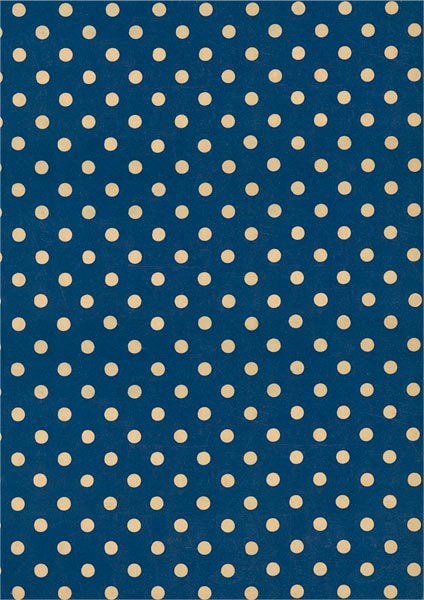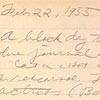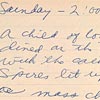 Sex, Drugs, and Ennui: Tennessee Williams (1911–1983). At the height of his literary success, dramatist Tennessee Williams was full of anxiety and dependent on drugs and alcohol. His diary revealed his inner anguish.
Sex, Drugs, and Ennui: Tennessee Williams (1911–1983). At the height of his literary success, dramatist Tennessee Williams was full of anxiety and dependent on drugs and alcohol. His diary revealed his inner anguish.
About the Diary
In February 1955 Tennessee Williams made his first entry in a cheap Italian exercise book with a cover featuring white polka dots on a blue background. "A black day to begin a blue journal," he wrote. From the time he started keeping a diary regularly in 1936, he had recorded such black and blue days—periods of low spirits and depression during which he was dogged by what he called his "blue devils." Though he sometimes read over past entries in disgust at his own "pusillanimous whining," the journals served as Williams' essential companion, a place to surrender to feelings of self-doubt, loneliness, and longing.
Now a prize-winning playwright after years of striving and wandering, he found himself unable to embrace success. As he watched Elia Kazan direct his new play, Cat on a Hot Tin Roof, in rehearsal, he felt "hellish—just about hanging on by the skin of my teeth." He found the lead actress, Barbara Bel Geddes "inadequate," while Burl Ives, as Big Daddy, "acted like a stuffed turkey." He considered the set in Philadelphia, where the play was in previews, "a meaningless piece of chi chi." The play opened to rave reviews (later winning both the Pulitzer Prize and New York Drama Critics' Award), but Williams felt only fatigue. "You see," he wrote, "I have nothing to say. The play production and its tensions drained every thing out of me. I have nothing to record but the continuity of days. They do continue, and I continue with them."
Williams made plans to escape to Europe: "Tomorrow, little blue book, we go to sea again and start another one of our strange, haunted summers in lovely Rome." Once in Rome, he made a stark entry: "Internal state: ominous." Calling himself "small, self-contained, somewhat dead, cold person, a sort of a lunar personality without the shine," he realized that only "some radical change can divert the downward course of my spirit, some startling new place or people to arrest the drift, the drag." He summoned his courage, traveled, swam, read D. H. Lawrence, and cruised. Still, by August, he had "nothing to say except I'm still hanging on."
In Hamburg in early September, he awaited a lover in his hotel after consuming a "pinkie" (Secanol), a double martini, and a scotch. After that night, he began writing in a different notebook but returned to this one two years later. Reading over his last entry from 1955 ("I've closed the drapes on the window so I can rest, and wait in a comforting twilight"), he wrote, "how nice that sounds to me now." He was again in a state of "imminent crack-up," traveling maniacally, feeling the impulse to "fly away," and above all, feeling "Lonely! Very lonely!" Still, he was writing again—a new play, Sweet Bird of Youth—and even in the face of chronic depression he ended many of his entries with his trademark signoff, a call to move forward: "En avant!"
Replica of the pattern on the cover of the diary of Tennessee Williams (1911–1983), 1955–58.


